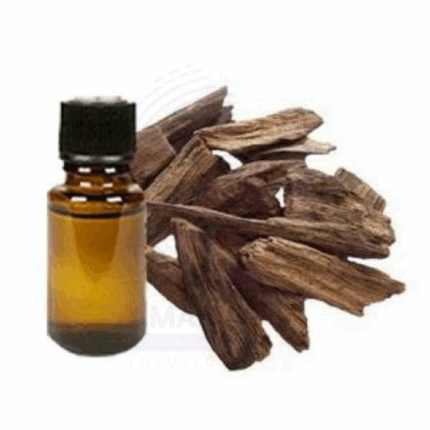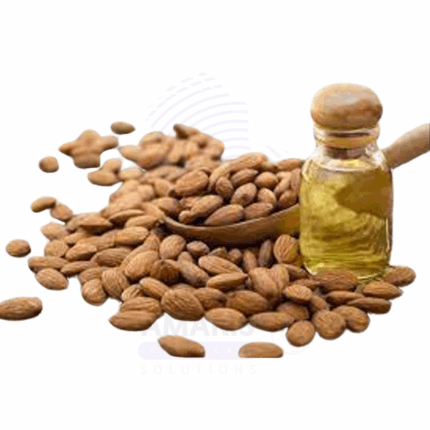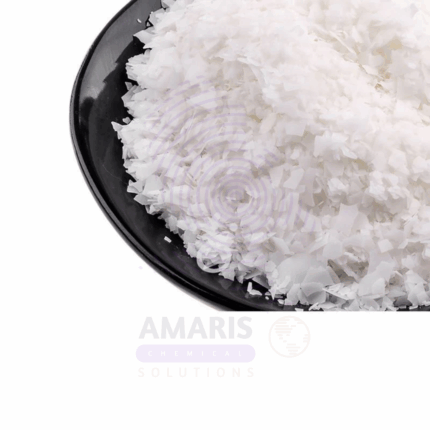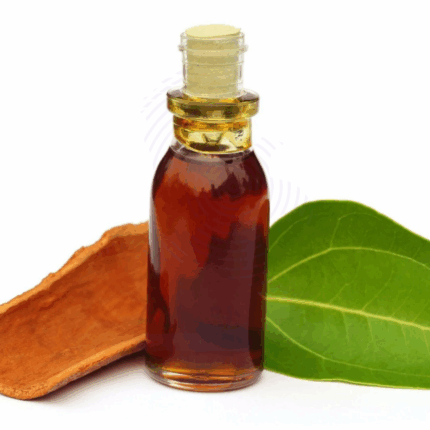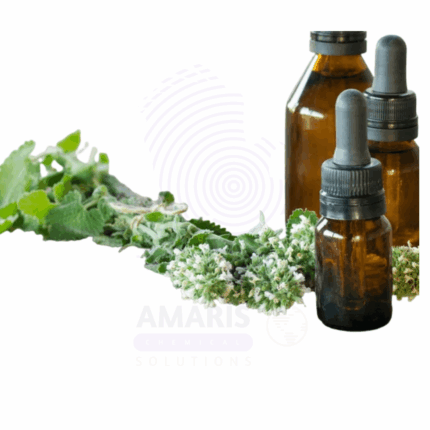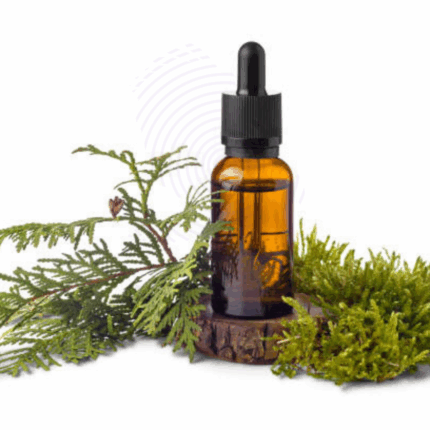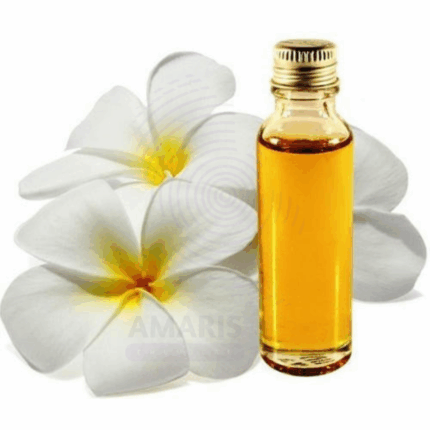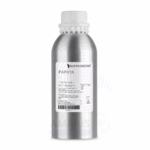
Papaya Fragrance Water Soluble
$ 18.00 Original price was: $ 18.00.$ 17.03Current price is: $ 17.03.

Passion Fruit Fragrance Oil
$ 28.00 Original price was: $ 28.00.$ 27.80Current price is: $ 27.80.
Thuja wood Oil
Whatsapp Order
Thuja Wood Oil is an essential oil extracted through steam distillation of the wood and twigs of the Thuja occidentalis tree, commonly known as Arborvitae or White Cedar. This oil is characterized by its fresh, woody, and slightly camphoraceous aroma with subtle earthy undertones. Rich in thujone, borneol, and fenchone, Thuja Wood Oil exhibits notable antimicrobial, antifungal, and insect-repellent properties. Traditionally used in herbal medicine and spiritual practices, it supports skin health, respiratory comfort, and natural insect deterrence. Its distinctive scent and versatile therapeutic benefits make it a valued ingredient in cosmetics, natural remedies, cleaning products, and aromatherapy blends.
Description
Table of Contents
Toggle
Thuja wood Oil
Primary Uses
- Aromatherapy & Wellness
- Diffused to promote mental clarity, focus, and emotional grounding
- Used in steam inhalation for respiratory support and congestion relief
- Incorporated in massage oils for muscle relaxation and joint discomfort
- Included in blends to reduce stress and enhance mood balance
- Cosmetics and Personal Care
- Added to skincare products for its antimicrobial and astringent effects
- Used in soaps and body washes for its fresh, woody fragrance and cleansing properties
- Included in deodorants and foot care formulations for odor control and skin refreshment
- Blended into hair care products to balance oily scalp and improve scalp health
- Topical Applications
- Diluted and applied in compresses or ointments to soothe minor skin infections and inflammation
- Used in insect repellent sprays and creams for natural bug deterrence
- Applied in anti-itch and wound-healing formulations to promote skin repair
Secondary Uses
- Cleaning and Detergent Products
- Incorporated into natural surface cleaners and disinfectants for antimicrobial action
- Used in deodorizing sprays and air fresheners with a fresh, woody aroma
- Added to laundry detergents and fabric softeners for scent and antimicrobial benefits
- Fragrance and Ambient Scenting
- Utilized as a middle note in perfumes with woody and herbal accords
- Blended into scented candles and room sprays to create a fresh forest atmosphere
- Employed in seasonal and nature-inspired fragrance compositions
- Industrial and Specialty Applications
- Used in natural insecticides and wood preservatives
- Employed in specialty adhesives and coatings where a natural wood scent is desired
- Incorporated in forestry-themed personal care and household product lines
KEY PRODUCT FEATURES
1. Basic Identification Attributes
- Botanical Name: Thuja occidentalis
- Common/Trade Name: Thuja Wood Oil
- INCI Name: Thuja occidentalis Oil
- CAS Number: 8002-79-5
- HS Code: 3301.29
- Synonyms: Arborvitae Oil, White Cedar Oil
2. Physical & Chemical Properties
- Physical State: Liquid essential oil
- Color & Odor: Pale yellow to amber; fresh, woody, camphoraceous aroma
- Solubility: Insoluble in water; soluble in alcohol and fixed oils
- Refractive Index: 1.470 – 1.490
- Specific Gravity: 0.880 – 0.930
- Main Components: Thujone, borneol, fenchone, sabinene
3. Safety & Hazard Attributes
- GHS Classification: May cause skin irritation and sensitization; contains neurotoxic thujone – use with caution
- Toxicity: Potentially toxic if ingested in large quantities; for external use only
- Exposure Limits: Refer to Safety Data Sheet (SDS)
- Allergen Information: Contains allergens such as thujone and borneol
4. Storage & Handling Attributes
- Storage Conditions: Store in a cool, dry, well-ventilated area away from direct sunlight and heat
- Container Type: Amber glass or metal containers with secure closures
- Shelf Life: 12 to 24 months under proper storage conditions
- Handling Precautions: Use gloves and eye protection; avoid inhalation and prolonged skin contact
5. Regulatory & Compliance Attributes
- Produced in GMP-certified facilities
- Compliant with IFRA standards for fragrance use (restricted due to thujone content)
- Not classified as hazardous for transport under standard regulations with proper packaging
6. Environmental & Health Impact
- Biodegradability: Biodegradable under normal environmental conditions
- Ecotoxicity: Low aquatic toxicity at typical use concentrations
- Bioaccumulation: Not expected to bioaccumulate
SAFETY HANDLING PRECAUTIONS
Safety Handling Precautions
- PPE Required: Gloves, protective eyewear, and adequate ventilation during handling
- Handling Guidelines: Avoid inhalation of vapors; use in well-ventilated areas
First Aid Measures
- Inhalation: Move to fresh air; seek medical attention if breathing difficulties occur
- Skin Contact: Wash with soap and water; discontinue use if irritation or sensitization develops
- Eye Contact: Rinse thoroughly with water for at least 15 minutes; seek medical help if irritation persists
- Ingestion: Do not induce vomiting; seek immediate medical attention
Firefighting Measures
- Fire Hazards: Flammable liquid and vapor
- Extinguishing Media: Foam, dry chemical powder, carbon dioxide, water mist
- Special Precautions: Use full protective equipment and self-contained breathing apparatus
- Hazardous Combustion Products: Carbon monoxide, carbon dioxide, hydrocarbons
Related products
Agarwood oil
Agarwood oil, also known as Oudh Oil, is a rare and luxurious essential oil derived from the heartwood of the Aquilaria tree, primarily found in Southeast Asia. This dark, viscous oil is extracted through steam distillation of infected wood—formed when the tree produces a dark, aromatic resin in response to fungal attack. The resulting oil is one of the most precious and complex natural fragrances in the world, known for its deep, woody, smoky, and slightly sweet aroma.
Agarwood Oil is widely revered in perfumery, spiritual rituals, and traditional medicine. Its rich olfactory profile and fixative qualities make it an indispensable ingredient in high-end perfumes and incense. Additionally, it is used in skin care, wellness therapies, and emotional balancing practices due to its grounding, calming, and meditative effects. Agarwood Oil is produced in extremely limited quantities, which adds to its exclusivity and value.
Almond Bitter Oil
Almond Bitter Oil, derived from the kernels of bitter almonds (Prunus amygdalus var. amara), is an essential oil known for its sharp, nutty, and marzipan-like aroma. This oil is produced through steam distillation of crushed bitter almond kernels and contains a naturally occurring compound called benzaldehyde, which gives it its characteristic scent. In purified form (free of hydrogen cyanide), bitter almond oil is used in fragrance, flavoring, and pharmaceutical applications.
Due to its potent aroma and biochemical properties, it is widely used in perfumery, baked goods flavoring (in controlled quantities), aromatherapy, and traditional topical remedies. It is important to distinguish between natural bitter almond oil, which must be detoxified, and synthetic benzaldehyde, which is commonly used as a substitute in commercial formulations.
Almond Wax
Almond Wax is a natural, plant-based wax derived from the hydrogenation of almond oil (Prunus amygdalus dulcis). It is a creamy to white, semi-solid wax with a mild, nutty scent and excellent emollient properties. Almond Wax is rich in fatty acids and has a smooth, soft texture, making it ideal for use in cosmetic, personal care, and candle formulations.
Due to its gentle consistency, skin-friendly profile, and moisturizing capabilities, Almond Wax is widely used in body butters, balms, lip care products, massage bars, and artisan soaps. It functions as a natural alternative to petroleum-based waxes and provides structure, viscosity, and glide to formulations. It also finds application in soft wax blends for natural candle products.
Basil Exotic oil
Basil Exotic Oil is a steam-distilled essential oil extracted from the leaves of the Ocimum basilicum plant, specifically cultivated for its high linalool and methyl chavicol (estragole) content. Known for its sweet, herbaceous, and slightly spicy aroma, Basil Exotic Oil offers powerful aromatic and therapeutic properties. It is widely used in perfumery, cosmetics, personal care products, and aromatherapy for its stimulating, clarifying, and refreshing effects.
The oil’s high potency and distinctive scent make it a preferred choice in high-end fragrances, hair care products, and massage blends. It is also appreciated for its antibacterial, antifungal, and anti-inflammatory characteristics, making it valuable in natural wellness and skincare formulations.
Cassia Oil
Cassia Oil is a potent essential oil steam-distilled from the bark of Cinnamomum cassia, commonly known as Chinese cinnamon. It carries a strong, spicy, and warm aroma similar to true cinnamon but is more pungent and intense. Its reddish-brown to yellow appearance and high cinnamaldehyde content give it powerful antimicrobial, antifungal, and warming properties. Cassia Oil is used across various industries including food flavoring, pharmaceuticals, cosmetics, aromatherapy, and household products. Due to its strength, it is typically used in diluted concentrations.
Catnip Oil
Catnip Oil is a highly aromatic essential oil steam-distilled from the leaves and flowering tops of Nepeta cataria, a herbaceous plant from the mint family. Known for its characteristic minty, herbaceous, and slightly sweet scent, Catnip Oil contains nepetalactone, a compound recognized for its insect-repellent and calming properties. Though commonly associated with its euphoric effects on cats, Catnip Oil is widely used in aromatherapy, natural insect repellents, and personal care products for humans. It also finds niche applications in pet care formulations and herbal preparations.
Cedar Leaf Oil
Cedar Leaf Oil is a potent essential oil steam-distilled from the leaves and twigs of the Thuja occidentalis tree, also known as Northern White Cedar or Arborvitae. It has a sharp, camphoraceous, and woody aroma, largely due to its high thujone content. This oil is known for its antifungal, antiseptic, and insect-repellent qualities, making it a popular component in cosmetics, aromatherapy, natural cleaning products, and insecticides. It also plays a role in herbal and wellness applications when used topically and in moderation due to its potency.
Michelia Flower Oil
Michelia Flower Oil is an essential oil extracted through steam distillation or solvent extraction from the flowers of Michelia species (e.g., Michelia champaca, Michelia alba). Known for its rich, floral, and slightly fruity aroma, it is widely used in perfumery, aromatherapy, and traditional medicine. The oil is prized for its therapeutic properties and as a natural fragrance ingredient.


 Preservatives(food)
Preservatives(food) Flavor Enhancers
Flavor Enhancers Acidulants
Acidulants Sweeteners
Sweeteners Antioxidants
Antioxidants Colorants(food)
Colorants(food) Nutraceutical Ingredients (food)
Nutraceutical Ingredients (food) Nutrient Supplements
Nutrient Supplements Emulsifiers
Emulsifiers
 Collectors
Collectors Dust Suppressants
Dust Suppressants Explosives and Blasting Agents
Explosives and Blasting Agents Flocculants and Coagulants
Flocculants and Coagulants Frothers
Frothers Leaching Agents
Leaching Agents pH Modifiers
pH Modifiers Precious Metal Extraction Agents
Precious Metal Extraction Agents
 Antioxidants(plastic)
Antioxidants(plastic) Colorants (Pigments, Dyes)
Colorants (Pigments, Dyes) Fillers and Reinforcements
Fillers and Reinforcements Flame Retardants
Flame Retardants Monomers
Monomers Plasticizers
Plasticizers Polymerization Initiators
Polymerization Initiators Stabilizers (UV, Heat)
Stabilizers (UV, Heat)
 Antifoaming Agents
Antifoaming Agents Chelating Agents
Chelating Agents Coagulants and Flocculants
Coagulants and Flocculants Corrosion Inhibitors
Corrosion Inhibitors Disinfectants and Biocides
Disinfectants and Biocides Oxidizing Agents
Oxidizing Agents pH Adjusters
pH Adjusters Scale Inhibitors( water)
Scale Inhibitors( water)
 Antioxidants(cosmetic)
Antioxidants(cosmetic) Emollients
Emollients Fragrances and Essential Oils
Fragrances and Essential Oils Humectants
Humectants Preservatives
Preservatives Surfactants(cosmetic)
Surfactants(cosmetic) Thickeners
Thickeners UV Filters
UV Filters
 Fertilizers
Fertilizers Soil Conditioners
Soil Conditioners Plant Growth Regulators
Plant Growth Regulators Animal Feed Additives
Animal Feed Additives Biostimulants
Biostimulants Pesticides (Herbicides, Insecticides, Fungicides)
Pesticides (Herbicides, Insecticides, Fungicides)
 Active Pharmaceutical Ingredients (APIs)
Active Pharmaceutical Ingredients (APIs) Excipients
Excipients Solvents(pharmaceutical)
Solvents(pharmaceutical) Antibiotics
Antibiotics Antiseptics and Disinfectants
Antiseptics and Disinfectants Vaccine Adjuvants
Vaccine Adjuvants Nutraceutical Ingredients (pharmaceutical)
Nutraceutical Ingredients (pharmaceutical) Analgesics & Antipyretics
Analgesics & Antipyretics
 Analytical Reagents
Analytical Reagents Solvents(lab)
Solvents(lab) Chromatography Chemicals
Chromatography Chemicals Spectroscopy Reagents
Spectroscopy Reagents microbiology-and-cell-culture-reagents
microbiology-and-cell-culture-reagents Molecular Biology Reagents
Molecular Biology Reagents Biochemical Reagents
Biochemical Reagents Inorganic and Organic Standards
Inorganic and Organic Standards Laboratory Safety Chemicals
Laboratory Safety Chemicals Specialty Laboratory Chemicals(Special Laboratory Equipment)
Specialty Laboratory Chemicals(Special Laboratory Equipment)
 Demulsifiers
Demulsifiers Hydraulic Fracturing Fluids
Hydraulic Fracturing Fluids Scale Inhibitors(oil)
Scale Inhibitors(oil) Surfactants(oil)
Surfactants(oil) Drilling Fluids
Drilling Fluids
 Dyes and Pigments
Dyes and Pigments Bleaching Agents
Bleaching Agents Softening Agents
Softening Agents Finishing Agents
Finishing Agents Antistatic Agents
Antistatic Agents
 Admixtures
Admixtures Waterproofing Agents
Waterproofing Agents Sealants and Adhesives
Sealants and Adhesives Curing Compounds
Curing Compounds Concrete Repair Chemicals
Concrete Repair Chemicals Anti-Corrosion Coatings
Anti-Corrosion Coatings
 Surfactants(cleaning)
Surfactants(cleaning) Builders
Builders Enzymes
Enzymes Solvents (Cleaning)
Solvents (Cleaning) Fragrances
Fragrances
 Electronic Chemicals
Electronic Chemicals Catalysts
Catalysts Lubricants
Lubricants Photographic Chemicals
Photographic Chemicals Refrigerants
Refrigerants Automotive chemicals
Automotive chemicals Pyrotechnic Chemicals
Pyrotechnic Chemicals
 Biodegradable Surfactants
Biodegradable Surfactants Bio-based Solvents
Bio-based Solvents Renewable Polymers
Renewable Polymers Carbon Capture Chemicals
Carbon Capture Chemicals Wastewater Treatment Chemicals
Wastewater Treatment Chemicals
 Pigments
Pigments Solvents(paint)
Solvents(paint) Specialty Coatings
Specialty Coatings Binders/Resins
Binders/Resins Additives
Additives Driers
Driers Anti-Corrosion Agents
Anti-Corrosion Agents Functional Coatings
Functional Coatings Application-Specific Coatings
Application-Specific Coatings
 Leavening Agents
Leavening Agents Dough Conditioners
Dough Conditioners Flour Treatments
Flour Treatments Fat Replacers
Fat Replacers Decoratives
Decoratives Preservatives(baking)
Preservatives(baking)
 Plasticizers & Softeners
Plasticizers & Softeners Reinforcing Agents
Reinforcing Agents Adhesion Promoters
Adhesion Promoters Vulcanizing Agents
Vulcanizing Agents Antidegradants
Antidegradants Blowing Agents
Blowing Agents Fillers & Extenders
Fillers & Extenders Accelerators & Retarders
Accelerators & Retarders


